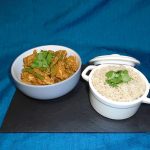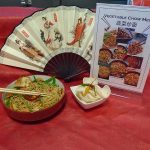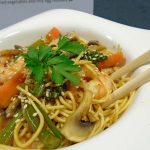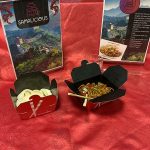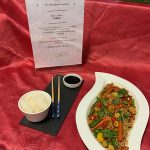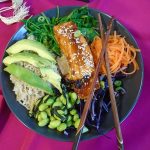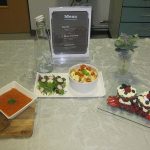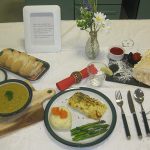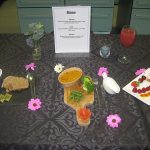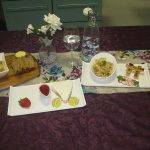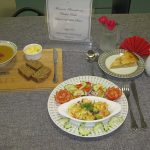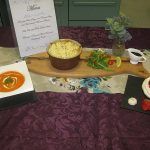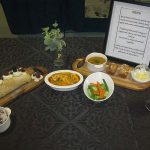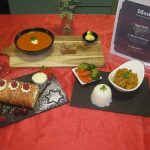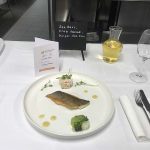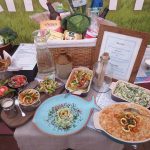Home Economics

Magazine Articles
Banbridge Academy Magazine 2021-2022: Home Economics Article
Banbridge Academy Magazine 2022-2023: Home Economics Article
Banbridge Academy Magazine 2023-2024: Home Economics Article
Aims and Vision
Through the study of Home Economics, we aim to equip our young people with the knowledge, skills and competences which will help them to be resourceful in their day to day lives. Pupils will be provided with opportunities to explore real life situations related to health and nutrition, family life and independent living.
Our overall aims are:
- To foster an interest in, and enjoyment of Home Economics, by providing a range of learning opportunities and teaching strategies so that pupils take pride in their achievements, and value the subject as an important contributor towards achievement in school, and recognise its contribution to life beyond school.
- To develop knowledge and understanding of current nutritional advice and apply this within the context of diet and lifestyle.
- To help pupils in their role within a changing society by encouraging careful organisation of both human and material resources, so they become discerning consumers and effective managers of resources in relation to home and family.
- To create an increasing awareness of technological changes and develop an ability to respond effectively to the effects of these within the home.
- To enable pupils to gain knowledge and understanding of the concepts of the family and the contribution of family life to the personal and social development of its members.
- To encourage initiative, self-reliance, responsibility, creativity and aesthetic awareness.
- To help pupils discriminate in choice, purchase, preparation and serving of food.
- To promote an understanding of the independence and interaction among individuals, families and communities.
- To help pupils understand themselves, question personal attitudes and develop confidence.
- To promote cross-curricular links, and links with other subjects in the school curriculum.
- To provide pupils with the skills and knowledge which they can apply to gain useful and relevant qualifications.
Key Stage 3
At Key Stage 3, Home Economics is a compulsory, contributory subject to Learning for Life and Work. During this stage pupils should be able to:
- Demonstrate skills in the safe, hygienic, healthy and creative use of food
- Research and manage information to investigate Home Economics issues, solve problems and make informed decisions
- Show deeper understanding of Home Economics, be more critical, think flexibly and make reasoned judgments
- Demonstrate creativity and initiative when developing own ideas
- Communicate effectively in visual, oral, written, mathematical and ICT formats
- Work effectively with others
- Demonstrate self-management by working systematically, persisting with tasks, evaluating and improving own performance
Year 8
Year 8 pupils will cover a range of units which include:
Safety and Hygiene; Use of equipment; Meal planning and preparation using the eatwell plate guidelines; Family life; Traditional cooking at Halloween, Christmas and Easter. All pupils will have the opportunity to achieve the Banbridge Academy 1 Star Chef Award.
Year 9
Year 9 pupils will cover a range of units which include:
Planning and preparation of meals using the eatwell plate guidelines; Ethical shopping; Food safety; Needs of young children and teenagers; traditional cooking at Halloween; Christmas and Easter. All pupils have the opportunity to take the Banbridge Academy 2 Star Chef Award.
Year 10
Year 10 pupils will cover a range of units which include:
Planning and preparation of meals using the eatwell plate guidelines; Special diets: Vegetarian, Food Allergies and Sports Nutrition; Ethical shopping; Shopping Online; Foods around the world; Marketing Strategies for a new product; Traditional cooking at Halloween, Christmas and Easter. All pupils have the opportunity to take the Banbridge Academy 3 Star Chef Award.
GCSE
Food and Nutrition
OVERVIEW
- Our GCSE in Home Economics: Food and Nutrition is a linear course.
- There are two components: one externally assessed (examination – 50%) and one internally assessed (Controlled Assessment – 50%).
- Both assessments are completed at the end of the course.
- The specification allows students to develop knowledge, understanding and skills relating to the:
– nutritional content of foods;
– nutritional and dietary needs of specific groups and how to cater for them;
– health issues associated with dietary and lifestyle choices;
– factors affecting how we buy food, what we buy and what we waste;
– importance of food safety; and
– preparation of food, cooking and presentation of dishes.
- The specification allows students to progress to GCE and/or other courses of study or employment. • Students have opportunities to build on the skills and capabilities developed through the delivery of the Northern Ireland Curriculum at Key Stage 3.
- A range of support material is available, including specimen assessment materials, exemplar planning frameworks, and teacher guidance on controlled assessment.
SPECIFICATION SUMMARY
Component 1: Food and Nutrition External examination, 2 hours, includes multiple-choice, short and structured questions, and extended writing questions
Component 2: Practical Food and Nutrition Controlled assessment: practical activity and a written element
BENEFITS TO STUDENTS
Students will:
- develop their knowledge and understanding of food and nutrition and apply skills to real-life contexts;
- have opportunities to build on the skills and capabilities developed at Key Stage 3;
- have opportunities to develop confidence in demonstrating high level practical food skills; and
- be able to progress to GCE Nutrition and Food Science or other related courses.
AS/A2 Level Nutrition and Food Science
Candidates are required to study two units for the AS course and a further two units for the full Advanced GCE (A2) course. All units are compulsory. A2 1 offers a choice of options and a research project which is internally assessed.
AS Content
Unit AS 1: Principles of Nutrition.
This unit requires the study of macro-nutrients: protein, fat and carbohydrates, and micro-nutrients: vitamins and minerals, and other dietary constituents. Nutritional requirements and current dietary recommendations for each life stage are also studied e.g. pregnancy, infancy, adults and frail elderly.
Unit AS 2: Diet, Lifestyle and Health.
This unit requires the study of current research in relation to diet, lifestyle and health including: cardiovascular disease, obesity, diabetes and cancer. Eating patterns, and energy balance and physical activity guidelines for children and adults are also studied.
A2 Content
Unit A2 1 Option A: Food Security and Sustainability.
This unit examines consumer behaviour when making food purchasing decisions and considers the issues and implications of consumer food choice.
OR
Unit A2 1 Option B: Food Safety and Quality.
This unit explores securing a safe food supply from the primary producer to the consumer.
Unit A2 2: Research Project.
This unit requires the submission of a report on a research project of the student’s own choice. The chosen research area should come from AS 1, AS 2 or A2 1. The project gives students opportunities to demonstrate appropriate knowledge, understanding and skills demanded by the process.
Assessment
AS 1: Nutrition for Optimal Health – 50% of AS, 20% of Advanced Level
AS 2: Priority Health Issues – 50% of AS, 20% of Advanced Level
A2 1: Consumer Issues – 30% of Advanced Level
A2 2: Research-based Assignment – 30% of Advanced Level
Career Opportunities
The study of Home Economics at GCSE and AS/A2 level can present career opportunities for pupils who may be interested in the following fields of study:
- Food technology – product development;
- Catering and hospitality industry – chefs, management;
- Health education;
- Media studies;
- Consumer studies – trading standards, consumer legislation;
- Environmental health;
- Advertising and marketing;
- Health and social services – administration, nursing, child care and research work.
Pupil Achievements
Many of our students have excelled at GCSE and Advanced Level gaining top ranking places. Several students have received the British Nutrition Foundation GCSE Award
The presentations were made at the Royal College of Physicians in London and on two occasions these were made by HRH The Princess Royal, who is the BNF patron.
Extra-Curricular
The Junior Cook’s Club takes place once a week after school where the pupils make a range of sweet and savoury dishes.
In the Department we encourage our pupils to enter a wide variety of competitions. Below are some pictures of the successful entrants.

